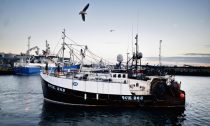
Marine wildlife in a vast area of ocean to the north of Scotland is at risk from trawlers because of a gaping loophole in international fishing regulations.
Over 4,000 square kilometres of seabed on the West Shetland Shelf – where endangered cod, starfish and anemones are meant to be protected – are due to open up to trawling on 14 August.
A European Union (EU) ban on trawling for cod in the area is being lifted, while plans to restrict fishing as part of a “marine protected area” have been delayed and won’t come into force for many months.
One trawler skipper fears that the area will be “totally decimated within 48 hours”, and there are concerns that Orkney’s creel fishing industry will be harmed. Environmentalists warn of a return to “smash and grab” fishing damaging wildlife and wiping out cod.
The white fish trawling industry, however, promises to target fish other than cod, and says it is “committed to protecting important cod areas”. The Scottish Government is offering to mediate and help the industry impose “temporary unilateral measures”.
The West Shetland Shelf, also known as “windsock” because of its shape, is to the north west of the Orkney islands. It covers an area the size of the Cairngorms National Park with waters 70 to 150 metres deep.
In 2001 the area was closed to trawlers by the EU to protect spawning grounds for collapsing cod populations. In 2014 it was also designated as a marine protected area (MPA) by the Scottish Government.
According to the UK governments’ Joint Nature Conservation Committee (JNCC), the sand and gravel beds on the West Shetland Shelf support a “particularly rich diversity of wildlife”.
As well as fish such as cod, plaice and bass, there are cup sponges, hermit crabs, squat lobsters, starfish, urchins and anemones. In June JNCC announced that scientists exploring the area had discovered a completely new species of worm “with its eyes in its head and in its bottom”.
But prolonged negotiations to agree statutory restrictions on fishing in the MPA have stalled because of international arguments. According to the Scottish Government, progress now depends on Brexit being resolved.
Meanwhile the EU has agreed to amend “technical measures” regulations, effectively ending the ban on cod trawling in the windsock area. The new rules are scheduled to be announced on 25 July and become law on 14 August.
This has sparked fears that cod will be overfished, and wildlife destroyed. “I think keeping it closed as a breeding ground is the best idea,” said Steven Clarke, skipper of the Buckie-registered trawler, Caledonia III, which fishes in Orkney waters.
“In my opinion it feeds many of the areas that I work. All that will happen opening it is that it will get totally decimated within 48 hours. That is no good to anybody at all.”
He added: “It is a fact, though, that as soon as it opens it will get decimated by boats – totally wiping it out.”
Fishing boats from Orkney lay creels on the seabed to catch brown crabs in the windsock area. The catches underpin the island’s fishing industry, supporting two processing factories and around 140 jobs.
There has long been conflict at sea between the creel industry’s “static” gear and the trawling industry’s “mobile” gear. Creelers claim that trawlers displace their gear, costing them tens of thousands of pounds.
“To lift a closure without any pre-planning will cause issues of fishing displacement, gear relocation and a domino effect of fishing pressures to other locations,” warned Fiona Matheson, secretary of Orkney Fisheries Association.
“Time needs to be taken to properly plan the changes and as an organisation we are more than willing to co-operate meaningfully on sea sharing as long as measures can be enforced and complied with under the law to protect the economic links to Orkney.”
She said a meeting had been arranged in an attempt to resolve conflicts, and it was essential for the Scottish Government to act as “honest broker” in the process. “Our recent experience in attempting voluntary resolutions has left us sceptical as to whether these could work under current regulations,” she added.
The campaign group, Open Seas, wants the West Shetland Shelf MPA to remain closed to trawlers. “The fishing industry, scientists and environmental groups have all already agreed that this site needs protection,” said the group’s head of policy and operations, Phil Taylor.
“It is therefore extremely disappointing to see that Scottish white fish producers are trying to short circuit this democratic process and use a legal loophole to smash and grab in one of the most important parts of our seas.”
Taylor highlighted the latest science suggesting that North Sea cod stocks were in decline and recommending a 70 per cent cut in catch in 2020. “Allowing trawling would undoubtedly deteriorate the health of the habitat,” he warned.
“This would constitute a dereliction of duties and a significant legal risk for the Scottish Government, as well as any trawlers in the area.”
There was now a real opportunity to improve the health of our oceans and see sustainable seafood on our plates, Taylor argued. “Allowing yet more damaging bottom trawling inside our marine protected areas is no way to capitalise on this opportunity: it is just driving us yet further into the abyss.”











Social Profiles